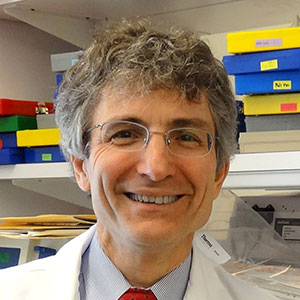Gregory G. Germino, M.D.

- Deputy Director: Office of the Director
- Acting Chief: Kidney Diseases Branch
- Section Chief: Polycystic Kidney Disease Section, Kidney Diseases Branch
- Section Chief: Clinical Nephrology Section, Kidney Diseases Branch
Professional Experience
- Senior Investigator, Kidney Diseases Branch, NIDDK, NIH, 2009–Present
- Adjunct Professor of Medicine, Johns Hopkins University School of Medicine, 2009–Present
- Professor of Medicine, Division of Nephrology, Johns Hopkins University School of Medicine, 2003–2009
- Affiliate Member, McKusick-Nathans Institute of Genetic Medicine, Johns Hopkins University School of Medicine, 2002–2009
- Joint Appointment, Department of Molecular Biology and Genetics, Johns Hopkins University School of Medicine, 2001–2009
- Associate Professor of Medicine, Division of Nephrology, Johns Hopkins University School of Medicine, 1997–2003
- Assistant Professor of Medicine, Division of Nephrology, Johns Hopkins University School of Medicine, 1992–1997
- Associate Research Scientist, Instructor and Assistant Professor, Yale University School of Medicine, 1988–1992
- Research Post-Doctoral Fellow, Nuffield Department of Medicine, Oxford University, 1987–1988
- Clinical Post-Doctoral Fellow, Nephrology, Yale University School of Medicine, 1986–1987
- Internal Medicine Residency, Yale–New Haven Hospital, 1983–1986
- M.D., University of Chicago Pritzker School of Medicine, 1983
- B.S., Loyola University of Chicago, 1979
Current Research
The function of the kidney critically depends on the proper structure of its tubule system, yet regulation of tubular diameter is a poorly understood phenomenon. Cystic diseases of the kidney offer unique opportunities to study these processes. My research focuses on the molecular basis of renal cystic disease and renal tubular morphogenesis.
Autosomal dominant polycystic kidney disease (ADPKD) affects approximately 1/1000 Americans. Cysts arise at all stages of life, and gradually expand to replace normal renal parenchyma. This process results in end stage kidney failure (ESKF) in approximately half by the 6th decade, accounting for approximately 5 percent of all cases of ESKF. Autosomal recessive polycystic kidney disease (ARPKD) is rare (1/20,000) but often more severe. Therapies for both are limited to managing the complications. We have, however, made great progress in understanding their pathobiology and the role of the normal PKD gene products in regulating tubular morphology.
Mutations in either of two genes, PKD1 and PKD2, cause most forms of ADPKD. Mutations appear to compromise gene function, and much data implicate a molecular recessive model as responsible for initiating cyst growth. PKD1 and PKD2 encode components of a receptor-channel complex that likely has ciliary and non-ciliary functions. Using orthologous mouse models, we have demonstrated unsuspected, complex development-stage specific consequences of Pkd1 inactivation that are linked to metabolic pathways. These models also have been used to show that PKD genes are essential for proper form and function of multiple other organs. We are pursuing several parallel lines of inquiry regarding the relationship between PKD proteins, cellular metabolism, matrix, and planar cell polarity pathways.
ARPKD is a second interest. We identified the gene mutated in this disorder, PKHD1, and have shown that it likely encodes a very large membrane-associated protein that undergoes Notch-like proteolytic processing. We have developed a series of mouse lines and cell culture systems to model the disease and study the protein, and we have shown genetic interaction between the PKD1 and PKHD1 loci. Current efforts are focused on determining its function in kidney and liver development.
Select Publications
- The pathobiology of polycystic kidney disease from a metabolic viewpoint.
- Menezes LF, Germino GG.
- Nat Rev Nephrol (2019 Dec) 15:735-749. Abstract/Full Text
- A cleavage product of Polycystin-1 is a mitochondrial matrix protein that affects mitochondria morphology and function when heterologously expressed.
- Lin CC, Kurashige M, Liu Y, Terabayashi T, Ishimoto Y, Wang T, Choudhary V, Hobbs R, Liu LK, Lee PH, Outeda P, Zhou F, Restifo NP, Watnick T, Kawano H, Horie S, Prinz W, Xu H, Menezes LF, Germino GG.
- Sci Rep (2018 Feb 9) 8:2743. Abstract/Full Text
Research in Plain Language
The kidney is made up of millions of filter units and tubes that work together to rid our body of waste and to manage our fluids and electrolytes. Processes that alter the function of either the filters or the tubes can cause the kidneys to stop functioning properly. My research is focused on a set of conditions that causes cysts to form inside the kidney. Cysts are balloon-like structures filled with fluid that form from kidney tubes. While a few are common in the kidney as people age, kidneys fail when the cysts become too numerous or too large. Autosomal dominant (ADPKD) and autosomal recessive polycystic kidney disease (ARPKD) are hereditary conditions that can cause kidney failure due to kidney cysts. Polycystic kidney disease (PKD) affects 1/1000 people and is the fourth most common cause of kidney failure in the United States. Currently available therapies mostly treat symptoms, though one newly approved drug may slow progression.
Scientists do not understand how mutations in PKD genes lead to the formation of cysts. To develop better treatments, we must determine what the genes do and how they regulate tube size. We must also determine the factors that promote the growth of cysts so we can identify ways to safely block this. My laboratory is focused on addressing these gaps in our knowledge using experimental models and methods from multiple scientific discipines like systems biology, cell biology, molecular genetics and biochemistry. Our long-term goal is to use this information to guide development of therapies that prevent and treat cystic disease.

